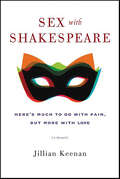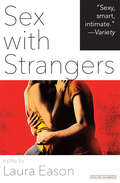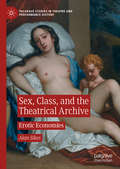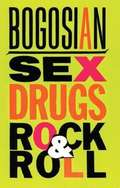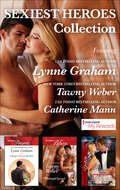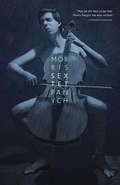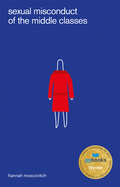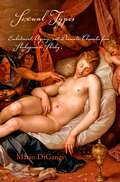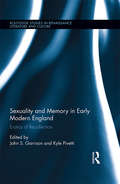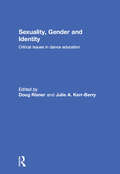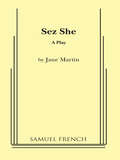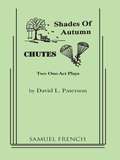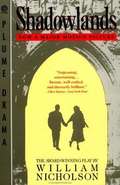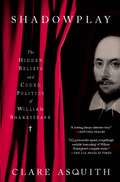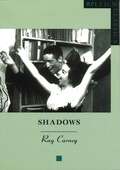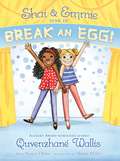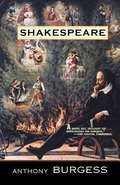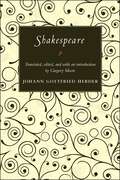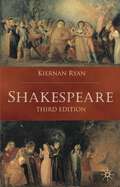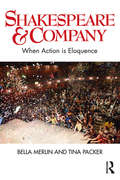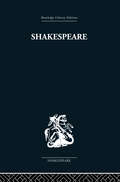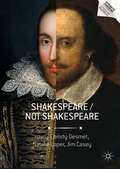- Table View
- List View
Sex with Shakespeare: Here's Much to Do with Pain, but More with Love
by Jillian KeenanA provocative, moving, kinky, and often absurdly funny memoir about Shakespeare, love, obsession, and spankingWhen it came to understanding love, a teenage Jillian Keenan had nothing to guide her—until a production of The Tempest sent Shakespeare’s language flowing through her blood for the first time. In Sex with Shakespeare, she tells the story of how the Bard’s plays helped her embrace her unusual sexual identity and find a love story of her own.Four hundred years after Shakespeare’s death, Keenan’s smart and passionate memoir brings new life to his work. With fourteen of his plays as a springboard, she explores the many facets of love and sexuality—from desire and communication to fetish and fantasy. In A Midsummer Night’s Dream, Keenan unmasks Helena as a sexual masochist—like Jillian herself. In Macbeth, she examines criminalized sexual identities and the dark side of “privacy.” The Taming of the Shrew goes inside the secret world of bondage, domination, and sadomasochism, while King Lear exposes the ill-fated king as a possible sexual predator. Moving through the canon, Keenan makes it abundantly clear that literature is a conversation. In Sex with Shakespeare, words are love.As Keenan wanders the world in search of connection, from desert dictatorships to urban islands to disputed territories, Shakespeare goes with her —and provokes complex, surprising, and wildly important conversations about sexuality, consent, and the secrets that simmer beneath our surfaces.
Sex with Strangers
by Laura EasonHow far will you go to get what you want? Will you be the same person if you finally do? When star sex blogger and memoirist Ethan, 24, tracks down his idol, the gifted but obscure 40ish novelist Olivia, he finds they each crave what the other possesses. As attraction turns to sex, and they inch closer to getting what they want, both must confront the dark side of ambition and the near impossibility of reinventing oneself when the past is only a click away. Sex with Strangers had its world premiere at Steppenwolf Theatre Company; it will have its New York premiere at Second Stage Theatre in June 2014, directed by David Schwimmer.
Sex with Strangers
by Laura EasonHow far will you go to get what you want? Will you be the same person if you finally do? When star sex blogger and memoirist Ethan, 24, tracks down his idol, the gifted but obscure 40ish novelist Olivia, he finds they each crave what the other possesses. As attraction turns to sex, and they inch closer to getting what they want, both must confront the dark side of ambition and the near impossibility of reinventing oneself when the past is only a click away. Sex with Strangers had its world premiere at Steppenwolf Theatre Company; it will have its New York premiere at Second Stage Theatre in June 2014, directed by David Schwimmer.
Sex, Class, and the Theatrical Archive: Erotic Economies (Palgrave Studies in Theatre and Performance History)
by Alan SikesIn Sex, Class and the Theatrical Archive: Erotic Economies, Alan Sikes explores the intersection of struggles over sex and class identities in politicized performances during key revolutionary moments in modern European history. The book includes discussions of sodomitical closet dramas from the decades surrounding the English Glorious Revolution of 1688; the performances of 'Tribades and Amazons', public women of the French Revolution; the 'homophilic elitism' in the early plays of Brecht and Hasenclever from the years just before and after the German Revolution that marked the founding of the short-lived Weimar Republic; and the utopian conception of a Soviet 'New Woman' set to take the stage after the Russian Revolution of 1917. Throughout, Sikes invokes the differences between past and present politicized performances in order to cast our own political imaginings into sharper and more critical relief.
Sex, Drugs, Rock & Roll
by Eric BogosianBogosian explores the dark underbelly of the American dream with blistering prose, trenchant social criticism and breathtakingly accurate characterizations of an astonishing range of his fellow citizens.
Sexiest Heroes Collection: A Ring to Secure His Heir, Midnight Special, and All or Nothing
by Lynne Graham Catherine Mann Tawny WeberThree sexy contemporary romances in one collection for the first time by New York Times bestselling author Tawny Weber and USA Today bestselling authors Lynne Graham and Catherine Mann.A RING TO SECURE HIS HEIR by Lynne GrahamWorking late is nothing new for tycoon Alex—and it's the perfect excuse to get close to office cleaner Rosie Gray. Intoxicated by the after-hours attentions of the mysterious businessman, Rosie's dreams end with the slamming of the bedroom door on their one-night stand. Discovering she's pregnant, she goes to confront him, but no one at work has heard of "Alex Kolovos." They do, however, know Alexius Stavroulakis, the CEO, and he has a glittering proposal for her!MIDNIGHT SPECIAL by Tawny WeberSomewhere on the train is a key witness to a murder. And reporter Marni Clare will do whatever it takes to get the story—even crashing in an unreserved sleeper car. But when she wakes, she finds herself curled up with the man she's seeking…and he's hot enough to derail all her plans! FBI special agent Hunter won't complain about the hot blonde in his arms. And maybe it's the medication he's on, but he's even agreed to share his room…. It's a long trip, and within days their berth becomes the scene of some steamy railway romps. But is Marni just having fun…or is she taking Hunter for a ride?ALL OR NOTHING by Catherine MannDespite the warning signs, Jayne Hughes married the bad boy. And Conrad Hughes, casino magnate, did just that with his absences and lies. Now she's ready to move on, but her husband has other plans…. Conrad's undercover work for Interpol destroyed his marriage. When Jayne comes to Monte Carlo seeking a divorce, he launches an all-out assault. Seducing his wife back into his bed is easy; earning her trust is another matter. Yet Conrad knows the odds favor the house. And he has no intentions of losing.
Sextet
by Morris Panych"The best script Morris Panych has ever written."?Toronto StarA blizzard strands six musicians in their motel with only their instruments, each other, and their secrets to keep them warm. Where will everyone sleep when everyone is sleeping with everyone else? Morris Panych is internationally recognized as one of North America's master playwrights.
Sexual Misconduct of the Middle Classes
by Hannah MoscovitchThe archetypal student-teacher romance is cleverly turned on its head for the post-#MeToo era in this striking new play by the acclaimed author of What a Young Wife Ought to Know and Bunny. Jon, a star professor and author, is racked with self-loathing after his third marriage crumbles around him when he finds himself admiring a student—a girl in a red coat. The girl, nineteen-year-old Annie, is a big fan of his work, and also happens to live down the street. From their doorways to his office to hotel rooms, their mutual admiration and sexual tension escalates under Jon’s control to a surprising conclusion that will leave you wanting to go back and question your perceptions of power as soon as you finish.
Sexual Politics in the Work of Tennessee Williams
by Michael S. D. HooperMichael S. D. Hooper reverses the recent trend of regarding Tennessee Williams as fundamentally a social writer following the discovery, publication and/or performance of plays from both ends of his career – the 'proletarian' apprentice years of Candles to the Sun and Not About Nightingales and the once overlooked final period of, amongst many other plays, The Red Devil Battery Sign. Hooper contends that recent criticism has exaggerated the political engagement and egalitarian credentials of a writer whose characters and situations revert to a reactionary politics of the individual dominated by the negotiation of sexual power. Directly, or more often indirectly, Williams' writing expresses social disaffection before glamorising the outcast and shelving thoughts of political change. Through detailed analysis of canonical texts the book sheds new light on Williams' work, as well as on the cultural and social life of mid-twentieth-century America.
Sexual Types: Embodiment, Agency, and Dramatic Character from Shakespeare to Shirley
by Mario DiGangiSexual types on the early modern stage are at once strange and familiar, associated with a range of "unnatural" or "monstrous" sexual and gender practices, yet familiar because readily identifiable as types: recognizable figures of literary imagination and social fantasy. From the many found in early modern culture, Mario DiGangi here focuses on six types that reveal in particularly compelling ways, both individually and collectively, how sexual transgressions were understood to intersect with social, gender, economic, and political transgressions.Building on feminist and queer scholarship, Sexual Types demonstrates how the sodomite, the tribade (a woman-loving woman), the narcissistic courtier, the citizen wife, the bawd, and the court favorite function as sites of ideological contradiction in dramatic texts. On the one hand, these sexual types are vilified and disciplined for violating social and sexual norms; on the other hand, they can take the form of dynamic, resourceful characters who expose the limitations of the categories that attempt to define and contain them. In bringing sexuality and character studies into conjunction with one another, Sexual Types provides illuminating new readings of familiar plays, such as Shakespeare's A Midsummer Night's Dream and The Winter's Tale, and of lesser-known plays by Fletcher, Middleton, and Shirley.
Sexuality and Memory in Early Modern England: Literature and the Erotics of Recollection (Routledge Studies in Renaissance Literature and Culture)
by John S. Garrison Kyle PivettiThis volume brings together two vibrant areas of Renaissance studies today: memory and sexuality. The contributors show that not only Shakespeare but also a broad range of his contemporaries were deeply interested in how memory and sexuality interact. Are erotic experiences heightened or deflated by the presence of memory? Can a sexual act be commemorative? Can an act of memory be eroticized? How do forms of romantic desire underwrite forms of memory? To answer such questions, these authors examine drama, poetry, and prose from both major authors and lesser-studied figures in the canon of Renaissance literature. Alongside a number of insightful readings, they show that sonnets enact a sexual exchange of memory; that epics of nationhood cannot help but eroticize their subjects; that the act of sex in Renaissance tragedy too often depends upon violence of the past. Memory, these scholars propose, re-shapes the concerns of queer and sexuality studies - including the unhistorical, the experience of desire, and the limits of the body. So too does the erotic revise the dominant trends of memory studies, from the rhetoric of the medieval memory arts to the formation of collective pasts.
Sexuality, Gender and Identity: Critical Issues in Dance Education
by Doug Risner and Julie A. Kerr-BerrySexuality is a difficult topic for all educators. Dance teachers and educators are not immune to these educational challenges, especially given the large number of children, adolescents, and young adults who pursue dance study and performance. Most troubling is the lack of serious discourse in dance education and the development of educative strategies to promote healthy sexuality and empowered gender identities in proactive ways. This volume, focused on sexuality, gender, and identity in dance education, expands this developing area of study and investigates diverse perspectives from public schools, private sector dance studios and schools, as well as college and university dance programs. By openly bringing issues of sexuality and gender to the forefront of dance education and training, this book straightforwardly addresses critical challenges for engaged educators interested in age appropriate content, theme and costume; the hyper-sexualization of children and adolescents; sexual orientation and homophobia; the hidden curriculum of sexuality and gender; sexual identity; the impact of contemporary culture; and mass media, and sexual exploitation. The original research provides a frank discussion, highlighting practical applications and offering insights and recommendations for today’s educational environment in dance. This book was originally published as a special issue of the Journal of Dance Education.
Sez She
by Jane MartinFull Length, Comedy. . Characters: 5 female. Bare stage with chairs. Written to be performed by five actresses, this sequel to Jane Martin's last monologue play picks up where VITAL SIGNS left off - in these funnier, stranger days of the 21st century. Reveling in virtues of brevity that include hilarity, surprise and homespun philosophy, these monologues roam the range of contemporary perspective on everything from sexual harassment to sleeping in theaters to the erotic appeals of silence. Whether biking across Massachusetts with 23,000 lawyers or reflecting on the meaning of a Pekinese dog with a picket fence stake through its heart, these characters know how to take the stage and make the most of their five minutes of fame.
Shades of Autumn & Chutes
by David PatersonShades of Autumn: After not seeing his father for many years, Douglas is alerted by a worried neighbor and returns to his childhood home where his elderly parent is displaying signs of senility. Douglas relocates his father into a small apartment near his own. The move triggers an emotional journey through time as Douglas growing up with his emotionally distant and gruff yet caring father. Scenes traverse three decades of joy and pain, regrets and discoveries. Chutes: In a distant nation during a recent war, two wayward American paratroopers are trapped by their chute strings in the jungle canopy miles behind enemy lines. The green recruit and the grizzled veteran prove to be much alike in their personal agonies and desire to survive as they are captured, imprisoned, hospitalized to recover and returned home.
Shadowlands
by William NicholsonDramatizes the relationship between the British writer and his American wife, whose death was a turning point in his philosophical outlook
Shadowplay
by Clare AsquithIn 16th century England many loyal subjects to the crown were asked to make a terrible choice: to follow their monarch or their God. The era was one of unprecedented authoritarianism: England, it seemed, had become a police state, fearful of threats from abroad and plotters at home. This age of terror was also the era of the greatest creative genius the world has ever known: William Shakespeare. How, then, could such a remarkable man born into such violently volatile times apparently make no comment about the state of England in his work? He did. But it was hidden. Revealing Shakespeare's sophisticated version of a forgotten code developed by 16th-century dissidents, Clare Asquith shows how he was both a genius for all time and utterly a creature of his own era: a writer who was supported by dissident Catholic aristocrats, who agonized about the fate of England's spiritual and political life and who used the stage to attack and expose a regime which he believed had seized illegal control of the country he loved. Shakespeare's plays offer an acute insight into the politics and personalities of his era. And Clare Asquith's decoding of them offers answers to several mysteries surrounding Shakespeare's own life, including most notably why he stopped writing while still at the height of his powers. An utterly compelling combination of literary detection and political revelation, Shadowplay is the definitive expose of how Shakespeare lived through and understood the agonies of his time, and what he had to say about them.
Shadows (BFI Film Classics)
by Ray CarneyShadows (1959), John Cassavetes' first film as director, ends with the title card - 'The film you have just seen was an improvisation'. Just before his death, however, Cassavetes confessed to Ray Carney something he had never before revealed - that much of his so-called 'masterpiece of improvisation' was actually written by him and Robert Alan Aurthur, a professional Hollywood screenwriter. In the ten years that followed Carney tracked down all of the surviving members of the cast and crew in order to piece together the true story of the making of Shadows. This book is the result of that research. Carney takes the reader behind the scenes to follow every step in the creation of the film - chronicling the hopes and dreams, the struggles and frustrations, and the ultimate triumph of their collaboration on one of the seminal masterworks of American independent film-making.
Shai & Emmie Star in Break an Egg! (A Shai & Emmie Story #1)
by Nancy Ohlin Quvenzhané Wallis Sharee MillerFrom Academy Award–nominated actress Quvenzhané Wallis comes the first story in a brand-new series about best friends Shai and Emmie, two third graders destined for superstardom.Shai Williams was born to be a star (or a veterinarian—and maybe a dentist). She attends a special elementary school for the performing arts, and her grandma Rosa and aunt Mac-N-Cheese are both actresses. So Shai is shocked when she doesn’t get the lead role in the third-grade musical. Instead, the part goes to the new girl, Gabby Supreme, who thinks she is better than everyone else. To add insult to injury, Ms. Gremillion has now asked Shai to help Gabby with the role. Shai reluctantly agrees and enlists Emmie to help, but Gabby isn’t going to make it easy. As opening night draws near, Shai discovers that making a new friend is sometimes like putting on a show—it requires dedication, patience, and lots and lots of practice.
Shakespeare
by Anthony BurgessLike Burgess's early novel, Nothing Like the Sun: A Story of Shakespeare's Love-Life, this equally delightful factual treatment of what we know of the Bard combines Burgess's stimulating erudition and his well-informed imagination. The result is at once a speculative biography, a theatrical history, and a re-creation of the Elizabethan age. Whether a vivid retracing of the evolution Elizabethan theater, a bravura reconstruction of the first performance of Hamlet, an infiltration of the intricacies of the court of the Virgin Queen, or an elegy on the era's end with the distrastrous Essex Rebellion, Burgess -- author of the classic A Clockwork Orange -- sets the stage for England's most glorious time and turns the spotlight on the figure of William Shakespeare. <p><p>"Animated by affection and an understanding of the creative imagination that only a creative writer can bring to bear."—Atlantic Monthly<p> "A smooth-flowing narrative, often enlivened by Anthony Burgess's Joycean appetite for linguistic fantasy."—Economist<p> "Bright, racy...knowledgeable and humorous, alternately sensible and quirky."—Terry Eagleton, Commonweal <p>"Burgess's wonderfully well-stocked mind and essentially wayward spirits are just right for summoning up an apparition of the Bard...."—Daily Telegraph
Shakespeare
by Johann Gottfried HerderWithout Johann Gottfried Herder (1744–1803), we simply would not understand Shakespeare in the way we do. In fact, much literature and art besides Shakespeare would neither look the same nor be the same without the influence of Herder's "Shakespeare" (1773). One of the most important and original works in the history of literary criticism, this passionate essay pioneered a new, historicist approach to cultural artifacts by arguing that they should be judged not by their conformity to a set of conventions imported from another time and place, but by the effectiveness of their response to their own historical and cultural context. Rejecting the authority of a dominant and stifling French neoclassicism that judged eighteenth-century plays by the criteria of Aristotle, Herder's "Shakespeare" signaled a break with the Enlightenment, the approach of Romanticism, and the arrival of a distinctly modern form of aesthetic appreciation.With a vivid new translation and a fascinating introduction by Gregory Moore, this edition of Herder's classic will speak to today's readers with undiminished power and persuasiveness.
Shakespeare
by Kiernan RyanFirst published in 1989, this 3rd edition, a critical study of Shakespeare, has been revised, updated and expanded with new material, so it is twice the size of the first edition. The section on Shakespearean comedy now includes an essay on Shakespeare's first scintillating experiment in the genre, The Comedy of Errors, and a study of his most perplexing problem play, Measure for Measure. ; A new last chapter, ' Dreaming on things to come - Shakespeare and the Future of Criticism, reveals how much modern criticism can learn from the appropriation of Shakespeare by Oscar Wilde, George Bernard Shaw and James Joyce
Shakespeare
by Mark Van Doren34 chapters of critical and interpretative comment on each of the Bard's plays with another chapter on his poems
Shakespeare & Company: When Action is Eloquence
by Tina Packer Bella MerlinShakespeare & Company: When Action is Eloquence is the first comprehensive insight into this internationally acclaimed company founded in 1978 in Lenox, Massachusetts, by actor-director Tina Packer and voice pioneer Kristin Linklater, with the transformative power of Shakespeare’s language at its heart. Why act Shakespeare? What’s his relevance in the twenty-first century? Compelling answers to these questions lie at the center of this highly accessible journey into Shakespeare & Company’s aesthetics and practice. Drawing on hitherto unpublished material – including notebooks, lectures, interviews, rehearsal diaries – and the Company’s newly collated archive, this book provides insight into a working theatre company and sheds light on the role Shakespeare plays in our modern world. It also details: Shakespeare & Company’s founding and early history Its aesthetic based on the Elizabethan theatre’s principles of the Art of Rhetoric; Structure of the Verse; Voice and Movement; Clown; Fight; and Actor/Audience Relationship Vocational components of its Training Intensives Practical pedagogy of its Education programs Insights into its unique approaches to Performance Impact and legacy of its three lifetime founding members: Dennis Krausnick (Director of Training), Kevin G. Coleman (Director of Education) and Tina Packer (founding artistic director). Actors, directors, students, educators, scholars and theatre-lovers alike will find practical acting strategies, inspirational approaches to theatre making and lively insights into the sustaining of a unique and robust theatre company that has been thriving for over 40 years.
Shakespeare (Shakespeare Survey Ser. #Series Number 7)
by Allardyce NicollFirst published in 1952. An invaluable introduction to Shakespeare, this book places Shakespeare's work and criticism against the background of Elizabethan life in its historical, social, political, religious, linguistic and literary aspects. Contents include: The Problem of Interpretation; Shakespeare at Work; Man and Society; Man and the Universe; The Inner Life.
Shakespeare / Not Shakespeare
by Christy Desmet Natalie Loper Jim CaseyThis essay collection addresses the paradox that something may at once "be" and "not be" Shakespeare. This phenomenon can be a matter of perception rather than authorial intention: audiences may detect Shakespeare where the author disclaims him or have difficulty finding him where he is named. Douglas Lanier's "Shakespearean rhizome," which co-opts Deleuze and Guattari's concept of artistic relations as rhizomes (a spreading, growing network that sprawls horizontally to defy hierarchies of origin and influence) is fundamental to this exploration. Essays discuss the fine line between "Shakespeare" and "not Shakespeare" through a number of critical lenses--networks and pastiches, memes and echoes, texts and paratexts, celebrities and afterlives, accidents and intertexts--and include a wide range of examples: canonical plays by Shakespeare, historical figures, celebrities, television performances and adaptations, comics, anime appropriations, science fiction novels, blockbuster films, gangster films, Shakesploitation and teen films, foreign language films, and non-Shakespearean classic films.
